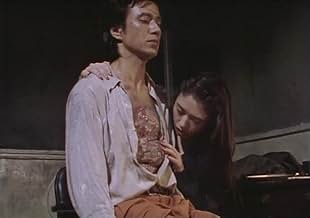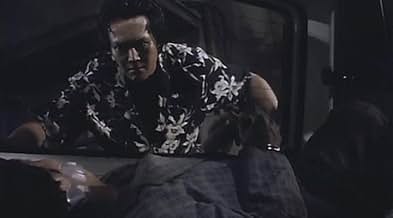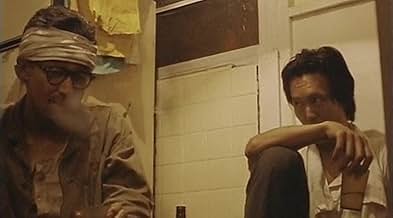Ajouter une intrigue dans votre langueTwo police detectives Numata and Tosaka infiltrate a group of underground black market human organ dealers. Things go haywire during a raid on the group's surgical headquarters.Two police detectives Numata and Tosaka infiltrate a group of underground black market human organ dealers. Things go haywire during a raid on the group's surgical headquarters.Two police detectives Numata and Tosaka infiltrate a group of underground black market human organ dealers. Things go haywire during a raid on the group's surgical headquarters.
- Réalisation
- Scénario
- Casting principal
Avis à la une
I really like this movie. I think it's really artful but also disturbing. In fact I understand that some people don't like it because the movie is hard to understand, and it has so much story in it, that I can't make a summary. Also is the Japanese filmgenre very different from the American and Europe cinema, and not all people like this. But this is really a must see for fans of movies like Pi, Tetsuo or Tetsuo II. It got all in it, dream scenes, disturbing gore scenes, a good soundtrack and a bad atmosphere, because everything in the movie is dirty, cold, ugly and brutal. So if you like to watch something different then a mainstream Hollywood movie you have to get this cool journey to the insane world of Kei Fujiwara
I just watched this movie last night, and I didn't understand it until I read the Mondo Macabro entry on it by Pete Tombs, and some of the reviews here (evidently, I'm not alone in thinking this film loses power by sacrificing narrative clarity for thematic integrity). The fact that the film is low budget and shot in 16mm (somewhat grainy; it would be great to see a Blu-Ray version with better subtitles) adds to the viewer's frustration. Still, Kei Fujiwara has undoubtedly created a nightmarish alternate universe and managed to get it on film which is at least worth five stars.
Organ is really more of an avant garde art film than straight horror, but then again, if you watch a lot of Japanese horror, you've probably noticed that this island culture takes the genre more seriously than in the west (which tends to see it as a more exploitive, money-making, freshman-director type genre). I can't say I enjoyed watching Organ much, but I do respect the director's unflinching vision and daring in bringing such a brutally dark tale to fruition.
Organ is really more of an avant garde art film than straight horror, but then again, if you watch a lot of Japanese horror, you've probably noticed that this island culture takes the genre more seriously than in the west (which tends to see it as a more exploitive, money-making, freshman-director type genre). I can't say I enjoyed watching Organ much, but I do respect the director's unflinching vision and daring in bringing such a brutally dark tale to fruition.
10myboigie
I'm astonished at some of the bad-reviews of this film--ignore them. If you love extreme cinema that explores the basis of the human-animal, you have found a home in the cinematic space-time continuum. Ostensibly, this is a Yakuza and detective film, with elements of film-noir and expressionism. It is not a purely genre film at-all, but an art-film with incredible complexity about what it is to be human. Fujiwara is best-known for her role in Tsukamoto Shinya's "Tetsuo: the Iron Man", and her relationship to his work shows here. The human-body is the battlefield, as well as the human-soul. Maybe it took an inspired woman to say this, and a Buddhist at-that. And in many-ways, this feels like a tale by Edgar Allan Poe! It has that feel to it, a very visceral, filth-covered psychology--what much real horror is. In-fact, I'd say it is on-par with Poe and his Japanese-analogue, "Edogawa Rampo" (a pen-name). This is a film I have watched several-times, and it always delivers a new-revelation. One-viewing is not enough to begin to understand it. If it is ugly, it is because life has ugliness. If it has beauty (it does), it is because life does.
There are roughly two narrative-paths in the film: first, the story of the outsider detective searching for his "dead" partner after their uncovering of a horrific black-market organ-smuggling ring run by Yakuza, and secondly, the story of the insiders of the ring, a brother-and-sister. The detective's-half reminded me strongly of Kurosawa's "Stray Dog" (aka "Nora Inu", 1949), and is probably a conscious-nod by Fujiwara. The brother has reanimated the lost-cop and is doing hellish experiments on him, while the sister--Yoko--runs the gang and fends-off the outside world. It's an interesting structure, which makes the film watchable numerous times, but the philosophical-themes of birth-and-death are even more rewarding. Yes, it is extremely low-budget, and shot in 16mm, but it is a well-executed film by a genuine maverick.
At the film's philosophical-center is the relationship with the surgeon-brother in the organ-ring, and the reanimated-cop. As grotesque as the half-dead cop appears, he is more human than the internally-diseased brother. In-fact, he is metaphor for the surgeon's remnants of humanity; Fujiwara makes it clear that the brother and sister were horribly-abused, the origin of their spiritual-decay and sadism. The reanimated-cop is hidden-away by the surgeon in a secret room, and they have an "internal-dialog." The other-half of the narrative is also very powerful, with the outsider detective's obsession with finding his partner taking a horrible-toll on his family. It seems that being a cop hasn't done him or his home any good--even before the body-snatching incident. Fujiwara paints life as-such: birth, mutilation at the hands of others, and finally, death. Sadly, this is the fate that awaits many human-beings in this inhuman era we inhabit. Out of this, one could surmise that Mrs. Fujiwara has a strong-ambivalence to motherhood. What is puzzling is why many women do not. This film is a contemporary-masterpiece. "Organ 2" has been completed, so expect more-of-the-same!
01.21.06 PS: It's hilarious how people don't get this incredible-film, but I believe it is still ahead-of-the-pack. American-audiences are used to a more linear-narrative structure, whereas audiences in Japan and Europe understand a film that is primarily thematic.
There are roughly two narrative-paths in the film: first, the story of the outsider detective searching for his "dead" partner after their uncovering of a horrific black-market organ-smuggling ring run by Yakuza, and secondly, the story of the insiders of the ring, a brother-and-sister. The detective's-half reminded me strongly of Kurosawa's "Stray Dog" (aka "Nora Inu", 1949), and is probably a conscious-nod by Fujiwara. The brother has reanimated the lost-cop and is doing hellish experiments on him, while the sister--Yoko--runs the gang and fends-off the outside world. It's an interesting structure, which makes the film watchable numerous times, but the philosophical-themes of birth-and-death are even more rewarding. Yes, it is extremely low-budget, and shot in 16mm, but it is a well-executed film by a genuine maverick.
At the film's philosophical-center is the relationship with the surgeon-brother in the organ-ring, and the reanimated-cop. As grotesque as the half-dead cop appears, he is more human than the internally-diseased brother. In-fact, he is metaphor for the surgeon's remnants of humanity; Fujiwara makes it clear that the brother and sister were horribly-abused, the origin of their spiritual-decay and sadism. The reanimated-cop is hidden-away by the surgeon in a secret room, and they have an "internal-dialog." The other-half of the narrative is also very powerful, with the outsider detective's obsession with finding his partner taking a horrible-toll on his family. It seems that being a cop hasn't done him or his home any good--even before the body-snatching incident. Fujiwara paints life as-such: birth, mutilation at the hands of others, and finally, death. Sadly, this is the fate that awaits many human-beings in this inhuman era we inhabit. Out of this, one could surmise that Mrs. Fujiwara has a strong-ambivalence to motherhood. What is puzzling is why many women do not. This film is a contemporary-masterpiece. "Organ 2" has been completed, so expect more-of-the-same!
01.21.06 PS: It's hilarious how people don't get this incredible-film, but I believe it is still ahead-of-the-pack. American-audiences are used to a more linear-narrative structure, whereas audiences in Japan and Europe understand a film that is primarily thematic.
Well, the first thing about Organ is, that you should not try to understand the storyline too much. This movie is extra-strange yet lives of its trashy and bizarre pictures. If you like purulent ulcerations exerbating and real weird erotics - it is the real thing for you. Don't expect a pure splatter movie but a picture with intense horror... To the story (as well as I can tell it): a biologist with a big mutation (spicy) cuts out organs from dead and alive people to sell them. After locking up the brother of a cop (whom he cuts off his limbs and letting him alive for unknown purposes) he is chased by the cop. And that's it...the rest evolves... Now to the effects: real cool sometimes, but also trashy and funny, butterfly collections, birthings, slimy blood-dripping...yet not state-of-the-art. Nice soundtrack also. For a conclusion, it's a real bizarre japanese splatting horror movie you should not miss if you want it different. I rate it a 7 of 10, but it has deserved a 10 for cult-factor.
After reading how violent this film was and that it had been banned even in Japan, I must admit I was excited about seeing it. After watching it multiple times, I still can't get much plot out of it. I got more from reading the back of the case than from the movie... As for the supposed over-the-top gore, I wasn't impressed. The effects are straight out of a Henenlotter or HG Lewis flick and there are more greens and yellows than red. I saw nothing so offensive that it would need to be censored. Visually, the film was interesting, with very vibrant colors. Is it violent and perverse? Yes. Is it as bloody as it's billing? No. I think it was an incoherent mess, comparable to "Tetsuo".
Le saviez-vous
- ConnexionsReferences La Mouche (1986)
Meilleurs choix
Connectez-vous pour évaluer et suivre la liste de favoris afin de recevoir des recommandations personnalisées
- How long is Organ?Alimenté par Alexa
Détails
Contribuer à cette page
Suggérer une modification ou ajouter du contenu manquant




















